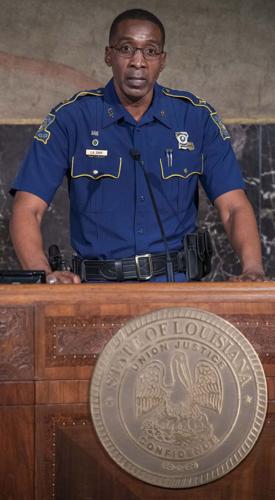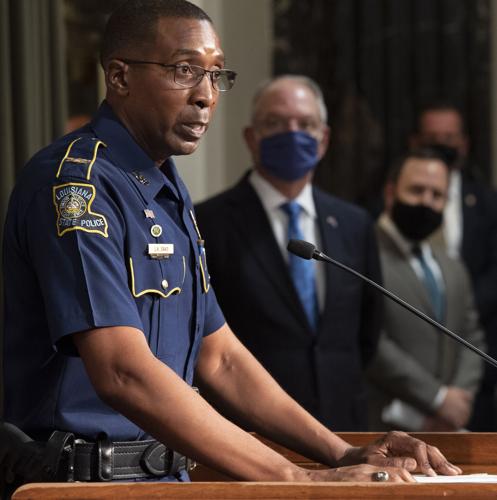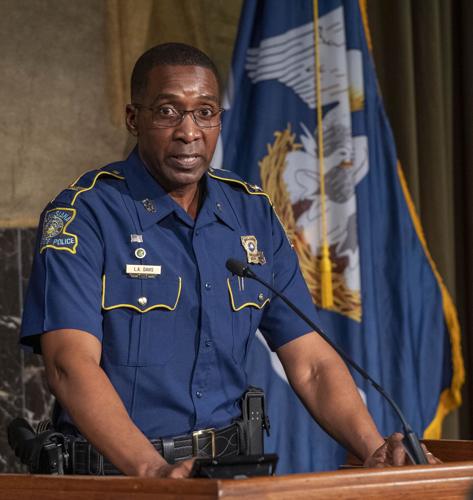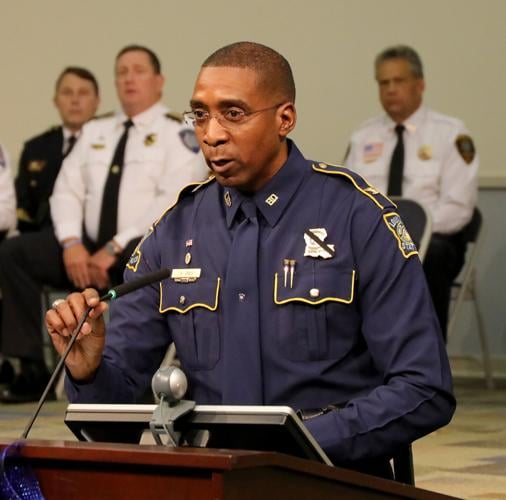In a recent conversation, Louisiana State Police Col. Lamar Davis spoke with columnist Will Sutton about his decision to become a state trooper, his challenging tenure as State Police superintendent and his policing philosophy.
Davis became superintendent in October, 2020, after he was appointed by Gov. John Bel Edwards. He is scheduled to leave the job Monday.
The interview has been edited for clarity and space.
Sutton: Colonel, as you look back, way back, like Southern University, undergraduate days, did you imagine being in charge of the Louisiana State Police?
Davis: No, sir, not for a second. In fact, it wasn't even my plan or thought, as I wasn’t going to college to work for this agency. I had a plan then to work for the federal government, maybe the FBI or U.S. Marshals. Of course, God didn't see it that way.
Sutton: What kinds of things did you learn as a young State Police officer that you hadn't learned, maybe during your years in active duty in the Army?
Davis: We come into people's lives at sometimes the worst possible time. As they're going through traumatic events and situations, they are stepping up. That taught me resilience. I thought that was vitally important. It taught me about people.
State troopers will lay down their life for you without knowing you. You can't measure that. You can't teach that. Someone either decides to do it or not do it. That lesson about life, that lesson about giving to others, about sacrificing for others, is something that has fueled a fire in me.
Sutton: With all of your experience, and specifically tech experience, when it comes to body-worn cameras, where do you draw the line? With the need for thorough investigations and a desire for the release of video footage that helps tell the story, how do you balance that?
Davis: While there is a desire for our citizens to get the story and get it quickly, I think it is important to get it accurately.
We have to understand that our mission is to keep our communities safe and to serve our public. When we are conducting an investigation so that we can solve crime, so that we can take information and deter or remove those that are committing crimes, then that's the balance. I think that balance is already established.
To just push out information without having a thorough understanding, without also being able to also thoroughly investigate, that inhibits our ability to solve crimes. While it gets the story out, it doesn't tell the true story. The camera footage being released does not tell us the entire story. It may not tell the why. It may not tell who's all involved. We have to remember our mission and think about humanity. Would you want that done to you?
Sutton: So that takes me to one of the most significant, one of the most tumultuous times before you came on. That was after Ronald Greene died in State Police custody in May 2019 following a high-speed chase; body camera video showed troopers beating, choking, shackling Greene before he died.
At least in part, that situation ended up providing you with this opportunity. That's a heck of a thing to walk into. It's one thing to rise through the ranks and have the opportunity. But to take it at a time like that. Why would you do that?
Davis: I can tell you, I did not know how big this thing was. My heart goes out to Ms. (Mona) Hardin (Greene's mother). My heart goes out to the Greene family. Those were some of the most difficult times. To look at Ms. Harden in her eyes and see the pain with the loss of her son — for me, that was a time that challenged me, in my soul, to be honest with her.
I did not have any background about what had occurred, right. I was trying to navigate something, and I did not have a foundation. So I was trying to learn as I go.
While I would love to go back and change what initially occurred and brought us to that point, I could not. But again, my hope to this day is that we can be at some point a shining a light in people's lives.
Sutton: I lived in northern Louisiana when I moved back to my home state in 2012. I've actually traveled the roads that Greene took, and I know the exit from the interstate. So I'm familiar with the State Police reputation there. Do you think that things have improved with the reputation of Troop F?
Davis: I have no doubt. I know this because I've also gone up there. I've talked to citizens out there.
Our authority is derived from the people we serve. The people that work at Troop F are some of the most courageous, professional people that you'll ever meet. I'm not saying that's 100% of everybody, but I will tell you, the vast majority of the people that we have working in this agency will gladly and willingly give of themselves and sacrifice their lives.
We've made some (leadership) changes. And those changes have resulted in being compassionate, being empathetic. Those troopers have done a phenomenal job in a very difficult situation. You had a small contingent that was involved in that situation. But yet, every man and woman was judged by what others did. And they had to go out and work under that duress, each and every day.
Sutton: Early in your tenure, you promised that you would do a thorough review. Not that long ago, you announced a whole bunch of things you decided needed to be implemented. What are some of the important things you are certain will continue after your time?
Davis: So I can't tell you if those reforms will continue because I'm not in control of the future. Nor will I be in charge of this agency. After Jan. 8, I can tell you that there are many men and women on this job that believe in that vision, and they will continue to carry out their duties. Regardless of who's in charge, they're going to continue to hold each other accountable, they're going to continue to be transparent, they're going to continue to have integrity as the foundation, and also compassion.
I think it's important to note that a lot of these changes have been a result of my conversations with other men and women. Some have said, 'Hey, we need to change, we need to do this.' One specific change is that the training academy has gone from a warrior mindset to a guardian mindset. What's significant about that is when that trooper leaves that academy, the mindset is 'I want to serve my community,' as opposed to 'there are people that are against me.'
Then that results in a different set of actions and behavior, and generally determines the outcome of a situation. Instead of screaming and yelling, and having that shark attack type mentality, we're now having a conversation. We're providing guidance. We're providing support.
Sutton: What's your take on the role of State Police in more urban areas such as New Orleans, and on interstates? What's your take on how state police have approached that in the past versus now?
Davis: In the past, we haven't really been involved in urban policing, if you want to call it that. But in the past two administrations, we've gotten more involved.
I think it's important because when we look at threats to our communities and threats to our citizens, our job is to work in areas to remove and deter people from adversely impacting our citizens and our communities. I think it's important for us to continue to work with all of our agencies to remove that threat to our citizens and to our community.
When we look at crime, by the time the police get there are, there are so many missed opportunities. Oftentimes crime is a result of a social problem. And I think we need to really think of it in that manner, so that we can start to get in front of it, as opposed to coming in behind. We cannot police our way or wrestle our way out of these problems. We must educate people educate kids earlier and more often. I think we need to also provide more social and mental health support. As when we do that, then what we will find is we will have less people committing crimes.
Sutton: What's your best advice and counsel for your successor?
Davis: Keep people first.
Sutton: You're still a young man as you retire from this job, so what's next?
Davis: In 2024, I'm gonna be at my house. I think I'll get started with the list that my wife wants me to get started with. I'm gonna relax. I have worked 30-plus years, and I've been away from my family. You can't give time back once it's gone, but what I can do is make use of the time that I have. I will continue to give back, and I'll continue to invest in our communities, I don't know what that looks like, right now. I tell people all the time, public safety is my purpose, but people are my passion, and I'm going to continue to live according to my purpose and my passion.














